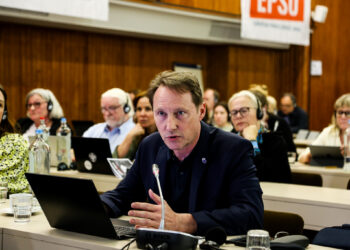Brussels – The European Economic and Social Committee (EESC) was established by the Treaty of Rome (signed in March 1957), and held its first plenary session in May 1958. Its past experience and lessons for the future were the subject of a debate on the “Celebration of the 65th anniversary of the European Economic and Social Committee: Empowering Civil Society, Defending Democracy”, held on 13 December 2023 in Brussels.”
Over the past 65 years, the Committee has built a true platform for civil society to freely express its views to improve the EU’s legislation. In the changing geopolitical context, the voice of a strong and independent civil society is now more important than ever. It is civil society, in its role as watchdog, who makes sure nobody switches off the checks and balances, the rule of law or fundamental rights and values – so that nobody ‘unplugs democracy,'”, said EESC President Oliver Röpke in a note.
EESC members represent the variety of civil society organisations across Europe, including business, trade unions and other interest groups. It is an EU consultative body that delivers opinions to the European Commission, the EU Council and the European Parliament, acting as a bridge between the EU’s decision-making institutions and EU citizens. “The EESC has turned 65 and you might have thought it was time to retire. But the opposite is true. The EESC is needed now more than ever, when so many Europeans face difficulties. The attempt to ignore the role of organised social dialogue should be resisted. Other EU institutions should listen to us more and more,” urged Georges Dassis, former President of the EESC and President of the Association of former members of the EESC.
As highlighted during the debate, the EESC has been a leading partner in the debate on the European Pillar of Social Rights in recent years. The EESC was also an integral part of the Conference on the Future of Europe, whose final recommendations explicitly mentioned the EESC as an instrument for increasing participation and transparency in EU democracy. Recent examples of the EESC’s pioneering role include being the first to call for a proper European Health Union and being at the forefront of proposing the “right to repair”. Stefano Mallia, President of the Employers’ Group, stressed the importance of the impact of the EESC’s work, highlighting the improvements made in legislation since 1958: “In recent months, we have accomplished several key goals, including the competitiveness check and an EU Blue Deal. And we will continue to work to bring forward the views of the people we represent.”
The energy transition, the fight against the climate crisis and the response to the geopolitical threat posed by Russia are just some of the challenges that reinforce the need for an EESC that helps to build consensus for the common good, to promote the values of European integration and to advance the cause of participatory democracy and civil society organisations. “For 65 years, the EESC has provided a platform for trade union representatives to engage in meaningful discussions with employers, civil society organisations and other institutions of the European Union. The success of the EESC lies in collaboration. By bringing together representatives from many different groups in society, we manage to produce opinions with many different perspectives. This inclusivity ensures that our work stays in line with democratic principles,” said Lucie Studničná, President of the Workers’ Group.
Séamus Boland, President of the Civil Society Organisations’ Group, called for the EESC to be fully mobilised for next year’s European elections. “The EU must bring collective problem-solving to common European challenges. Whether we achieve this will largely depend on the results of next year’s European Parliament elections. The EESC and its members have a mandate and a responsibility to reach out to citizens through their networks of civil society organisations to address disinformation, fears and lack of trust. We must also reiterate our call for real measures to implement dialogue with civil society at EU level in all policy areas,” said Boland.
English version by the Translation Service of Withub










